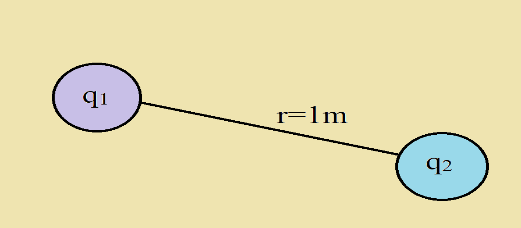Question
Question: The electrostatic potential energy of two point charges, \(1\mu C\)each, placed 1 meter apart in air...
The electrostatic potential energy of two point charges, 1μCeach, placed 1 meter apart in air is?
A. 9×103J
B. 9×109J
C. 9×10−3J
D. 9×10−3eV
Solution
An electric potential which is also known as the electric field potential, potential decrease, or electrostatic potential is the net – work done to move a unit charge from a point to a particular point under the influence of some electric field with zero acceleration. This question can easily be solved by using a simple formula of electrostatic potential energy between the two point charges. This formula can easily be derived by using Coulomb's law.
Formula used:
For solving the given question, we will be using the formula of Electrostatic potential energy, i.e.,
Electrostatic potential energy =U=rkq1q2
Complete step-by-step answer:

By using the above-given formula for Electrostatic potential energy, we have
Electrostatic potential energy =U=rkq1q2
Where k is the Coulomb’s constant, k=8.9875517923×109 kg⋅m3⋅s−2⋅C−2
For the sake of calculation, we will use k=9×109 kg⋅m3⋅s−2⋅C−2
And, q1 and q2 are the two point charges in this case,
q1=q2=1μC
Now,
q1=q2=1×10−6C
And, r is the distance between the two point charges, in this case
r=1m
Now, by using the given data in the electrostatic potential energy formula
U=rkq1q2
⇒U=19×109×1×10−6×1×10−6J
⇒U=19×109×1×10−12J
⇒U=19×109−12×1J
⇒U=9×10−3J
So, the electrostatic potential energy of two point charges, 1μC each, placed 1 meter apart in air is 9×10−3J
So, the correct answer is “Option C”.
Note: A coulomb is defined as the volume of electricity transported by a current of one ampere in a single second.
1C=6.24×1018electrons(Approximately)
The unit is named after Charles-Augustin de Coulomb, a French physicist who was active during the late 19th to mid 20th century. Electrostatic Potential energy is the reason why lightning happens.
